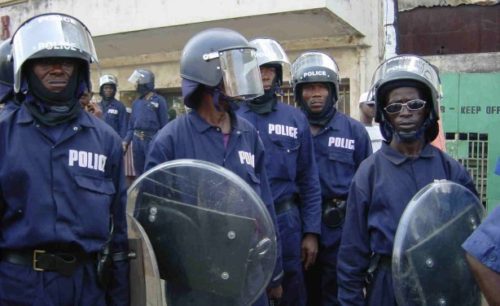
Sierra Leone Telegraph: 28 May 2018:
For far too long, the question as to whether Sierra Leone’s police force is a force for good, has dominated political and social discourse in the country. And the reality is that news of rising crime levels, shooting of unarmed citizens, unlawful arrests, unsolved criminal investigations, bribery and corruption, have fuelled accusation that the country’s police force is unfit for purpose.
Critics are pointing fingers at poor police recruitment, lack of proper training, poor remuneration and weak leadership, as the root cause.
 But there is little doubt, successive governments have manipulated and influenced the management of the police force for political advantage.
But there is little doubt, successive governments have manipulated and influenced the management of the police force for political advantage.
From the appointment of the Inspector General, the allocation of regional heads, to the policing of peaceful protests by citizens, the hand of State House is at work.
There is no doubting the fact that police officers are citizens too, and they have the right of association to political parties of their choice.
But when the discharging of their duty as custodians and enforcers of law and order becomes entwined with their political loyalties – especially in a society where tribalism and politics have become inseparable, then such conflict of interest can undermine and derail the very law and order they are supposed to enforce and maintain.
Once police officers are perceived by citizens as politically biased, trust and confidence in the force can be irreparably damaged, and citizens no longer regard the police as a force for good.
So, what is president Bio going to do to clean up the image of the police force, improve its operational management, and reconstitute it as a force for good? And can he succeed?
 According to report from State House, president Julius Maada Bio told the people of Sierra Leone last Friday, 25th May 2018, that ‘his government will depoliticize the Sierra Leone Police Force’. He made this statement whilst addressing new recruits of the Sierra Leone Police at the Hastings training field.
According to report from State House, president Julius Maada Bio told the people of Sierra Leone last Friday, 25th May 2018, that ‘his government will depoliticize the Sierra Leone Police Force’. He made this statement whilst addressing new recruits of the Sierra Leone Police at the Hastings training field.
President Bio said that the Police should be seen carrying out its duty with honesty, impartiality, care and free from corruption.
He also said that one of the challenges facing the force is low public confidence in the force. He told the new recruits that officers are recruited into the force to serve the nation and not to involve in politics.
In discharging what State House referred to as his ‘democratic war on corruption and indiscipline’, President Bio said: “Once again I want to reiterate that corruption and indiscipline in Sierra Leone Police will not be entertained by my government.”
He called on the police force to serve as agent of the change which the people of Sierra Leone voted for in the just concluded elections.
He promised to provide the required financial and logistical support to help capacitate the Police into a force which is fit for the 21st century.
Recognising the critical role of the Police the President said: “I also recognise the critical role you all play in creating a peaceful society as police officers; and most times, doing so at the risk of your own lives. Therefore, my government will ensure that the terms and conditions of service for members of the Sierra Leone Police reflect the importance of the task they perform.”
 The president had a parting message for the recruits: “To the recruits, as you pass out to join your families, remember you have all ascribed to an oath to serve our country diligently and put her interest above every other thing. Sierra Leone must be first in all you do. I entreat you all to sincerely serve the people with respect, honesty, professionalism and abide by our sacred constitution.”
The president had a parting message for the recruits: “To the recruits, as you pass out to join your families, remember you have all ascribed to an oath to serve our country diligently and put her interest above every other thing. Sierra Leone must be first in all you do. I entreat you all to sincerely serve the people with respect, honesty, professionalism and abide by our sacred constitution.”
The new recruits were the second batch of R2/2017 consisting 1,300 men and women, who successfully went through the requisite training to serve in the Sierra Leone Police.
Several of the recruits were awarded prizes for exceptional performance during their training. Four were promoted to the rank of Assistant Superintendent of Police.
Can president Bio successfully depoliticise and re-establish the police as a force for good, without strengthening the independence, accountability and governance of the police management board; and end all ‘orders from above’ that interferes with the operational management and decisions of senior officers?
Be the first to comment